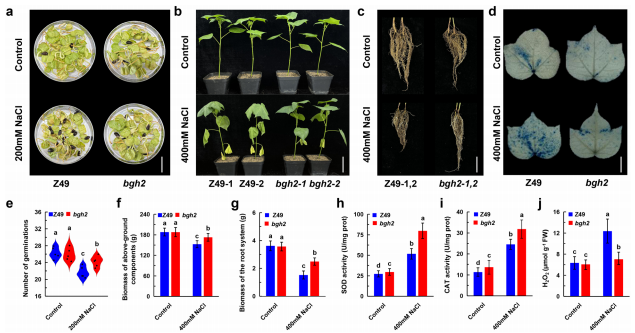Abstract:
Soil salinisation, exacerbated by climate change and human activities such as irrigation mismanagement, improper land use and excessive fertilisation, has become a major constraint on global crop production by disrupting fundamental metabolic processes like seed germination and photosynthesis. In our previous work, transcriptome sequencing of salt-tolerant and salt-sensitive cotton germplasms identified Gh_D04G136300, a negative regulatory gene downregulated in salt-tolerant and salt-sensitive materials. Phylogenetic analysis revealed its closest homologue to be AtBGH2, leading to its designation as GhBGH2. Virus-induced gene silencing (VIGS) demonstrated that GhBGH2 silencing enhanced salt tolerance. To further validate its function, we generated bgh2 knockout mutants via CRISPR/Cas9, which exhibited increased salt tolerance compared to controls. Transcriptome sequencing and yeast two-hybrid screening identified GhGLK1 as an interacting protein. Both GhBGH2 and GhGLK have nuclear localisation. Functional characterisation through VIGS revealed that GhGLK1 positively regulates salt tolerance in cotton. Yeast one-hybrid (Y1H), dual-luciferase (LUC) and electrophoretic mobility shift assays (EMSA) confirmed that GhGLK1 binds to G-box elements in the promoters of downstream salt-tolerance genes, activating their transcription. Structural analysis of GhGLK1 revealed a transcriptional activation domain at its C-terminus, and yeast heterologous expression along with coimmunoprecipitation (Co-IP) assays demonstrated that GhBGH2 interacts with this domain. Haplotype analysis of GhGLK1 identified a distinct Hap-1 variant enriched in China's northwestern saline-alkali regions. This variant exhibited elevated GhGLK1 expression and conferred enhanced salt tolerance. Collectively, our findings indicate that GhBGH2 negatively regulates salt tolerance in cotton by interacting with the GhGLK1 activation domain, suppressing its transcriptional regulation of salt-tolerance genes.
Key Words:
Cotton GhBGH2 GhGLK transcription factor salt tolerance transcriptional activity

|